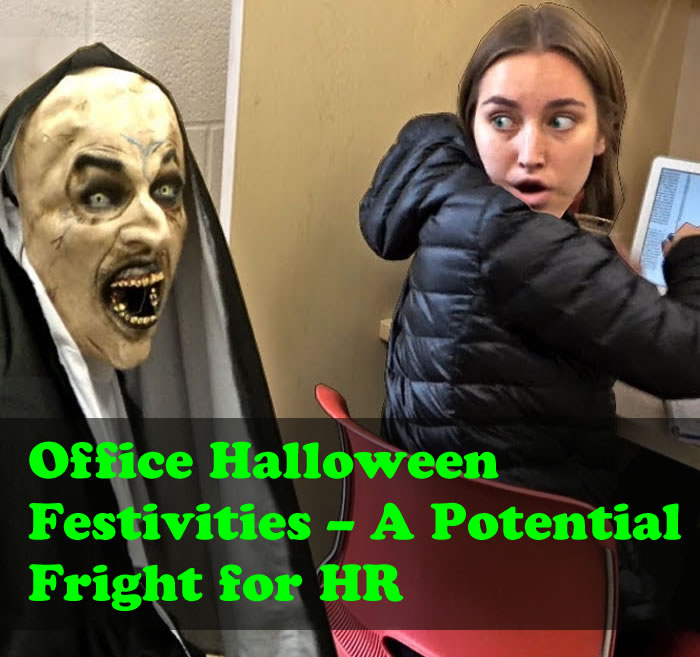Office Halloween Festivities – A Potential Fright for HR

Enforcing a reasonable, fair and professional dress code policy is difficult enough, but what can you do on that special day when the dress code gets tossed away like the innards of a carved pumpkin?
Halloween is always a special day for those responsible for overseeing employee behavior. Fun has its limits, and what constitutes tasteful and entertaining costumes is about as subjective as it gets.
For a timely reminder on some best practices for ensuring your workplace enjoys the Halloween celebration without incident, please continue to our blog.
Employee Halloween Costumes Can Give HR a Scare
Deciding whether to allow employees to dress up for Halloween can be a tricky question. Every year we see costumes in the news that cause public uproar. You don’t want the news article to be about one of your employees. Think through the issue carefully before you decide.
Keep the Spirit in Check
First, consider whether dressing up for Halloween is consistent with your company’s culture and customer expectations. Second, express to employees that they shouldn’t feel compelled to participate. If they do participate, they should dress in accordance with your antiharassment or productive workplace policy. Suggesting that an employee exercise good judgment likely doesn’t go far enough. Instead, you can provide ideas of costumes that are off-limits.
Management, as well employees, should consider the following:
Are Certain Costumes Ghoulish in My Industry?
In some industries, the typical Halloween costume could come off as distasteful. As an example, dressing up as a ghost or skeleton could not work in many settings, such as nursing homes or hospitals.
Professional service industries should also have employees consider scheduled meetings that day. Clients may expect a high level of professionalism, and costumes are rarely considered business casual.
No matter the costume, safety requirements must always be followed. Some costumes may limit mobility and productivity and violate safety requirements. Although a business may bend the normal dress code rules for Halloween, employees cannot neglect existing safety requirements.
Are Certain Costumes TSFW (Too Spooky For Work)?
Allowing employees to dress up requires oversight and regulation to ensure costumes are in good taste and don’t offend others in a culturally diverse company. We’ve all seen many news articles and stories about high-level politicians whose insensitive past costume choices have come back to haunt them. As those politicians should have done in years prior, employees must ask themselves before coming to work, “Am I likely to offend someone with my costume?”
The normal dress code should apply—costumes shouldn’t be revealing or sexually provocative. Essentially, all costumes that begin with “naughty” would be off-limits. And, just like everyday wear, costumes cannot contain discriminatory or derogatory messages or images.
The goal of allowing employees to dress up is to have fun, not to be boundary-pushing trendsetters. Employees should avoid costumes poking fun at controversial issues. Political costumes raise an especially controversial concern in the event they dress up as their favorite (or least favorite) candidate. There are also costumes that may be based on someone else’s culture and could be offensive, such as dressing up as a Native American.
Employees may also try to dress up as each other. Although this could indeed be funny, it could also be offensive if certain characteristics and attributes are inappropriately accentuated.
Was that Employee’s Nosy Question a Trick?
Although Halloween seems like a secular holiday, some employees may not wish to participate in the festivities for religious or other reasons. It’s important other coworkers don’t comment or pry into an employee’s decision not to participate. Management should never require an employee to participate to avoid running afoul of potential religious discrimination.
Treat Yourself to a Productive Workplace Halloween Celebration
Workplace rules requiring dignity and respect apply when picking a costume and throughout the day when commenting on others’ costumes. Following the normal dress code requirements and antiharassment policies requiring dignity and respect in the workplace should protect you from a scary situation.
Halloween can offer some fun to break up an otherwise boo-ring workday, but remember the golden rule about how to treat (not trick) others.
Article courtesy of content partner BLR. Author Morgan Geffre is a member of Foulston Siefkin LLP’s Employment & Labor Law Practice Group in the firm’s Wichita office.